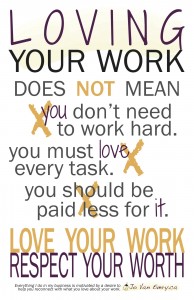I’ve been thinking about the term amateur.
I’m particularly drawn to the origin — “French, from Italian amatore from Latin amator lover”. I note that prior to the 19th century, usage is merely:
“A person who is fond of something; a person who has a taste for something”.
If you think about how you got on the path to an academic career, a fondness or a taste for something will probably come up.
- That might have been a fondness for your topic.
- It might have been a taste for the process of research: really enjoying sitting in an archive; or, the feeling when you find interesting things amongst what look like dry archival materials; or, the connections you make with research participants while engaged in a semi-structured narrative interview.
- It might be a fondness for teaching, perhaps for teaching particular types of students and seeing them develop new knowledge and skills.
Whatever it is, you started out as an amateur in this sense. You could see the professional possibilities on the horizon but it was your love that spurred you on.
Where did your love go?
Professional academic work is no longer a distant horizon. That is now the road you travel. Do you still feel that “burning, yearning feeling inside”? Or has that fire been all but extinguished by the demands of your job?
I suspect the flame has not been extinguished, but is under there somewhere, like the hot coals I use to restart the fire in my woodstove on a cold winter morning. It might require carefully chosen kindling, and some persuasion, but it’s there.
The first step is to believe your love for your work is worth rekindling. There are 2 common usages that are getting in the way. The first is that 2nd definition:
“A person who practises something, esp. an art or game, only as a pastime; an unpaid player, performer, etc. (opp. professional)”
Interestingly, although the definition of amateur indicates the opposite of professional, the definition of professional only indicates this for certain usages. It seems that this sense is most common in sport and the arts, which are both widely practised as pastimes.
That dictionary entry also notes derogatory usages:
“a dabbler”
“unskillful, amateurish”
No wonder it’s hard to aspire to being an amateur!
Interestingly these connotations only begin to appear in the late 18th century, with the adjective, amateurish, only coming into use in the mid-19th century.
As a sociologist, I notice that these terms come into use during the industrial revolution. I am also reminded of Max Weber’s arguments about the relationship between Calvinism and the cultural shifts necessary to those broader economic changes. I suspect you have a Calvinist gremlin whose theology is suspect and who mistakes Weber’s The Protestant Ethic and the Spirit of Capitalism for a bible, rather than serious sociological analysis and critique.
Academic labour as craft labour.
 Once we notice the coincidence between this separation of love and pay with the industrialization of labour, especially craft labour in the manufacture of objects, we can step back and look more closely at the nature of the work.
Once we notice the coincidence between this separation of love and pay with the industrialization of labour, especially craft labour in the manufacture of objects, we can step back and look more closely at the nature of the work.
The definitions “professional” and “craftsman” both focus on the level of skill and care, with the possibility of belonging to a guild or organization. Deep learning is also involved.
While “professional” has origins in religious professions and is associated more with mental labour, and “craft” is usually associated with manual, though highly skilled, labour, neither necessarily loses that sense of a fondness or taste for the work itself.
It is not the lack of love for your work that defines you as a professional. It is the deep learning you undertook to become a professional. It is the level of skill and care you bring to the work. It is your membership in a scholarly association.
You can still be an amateur in the (perhaps obsolete) sense of lover.
Further reading:
If you are interested in exploring the idea of craft, I recommend 2 books.
Matthew B. Crawford (2009) Shop Class as Soul Craft Penguin.
Richard Sennett (2008) The Craftsman Yale University Press.
Related Posts:
When you start to hate what you loved
Prioritising meaningful work when you are feeling overwhelmed and powerless









Leave a Reply